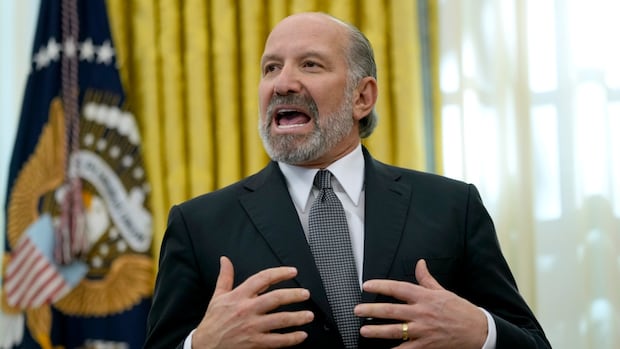The winds of uncertainty blowing across the Canada-U.S. border gained some clarity yesterday when U.S. Commerce Secretary Gina Raimondo brushed aside suggestions that free trade between the two nations is under threat.
Speaking to reporters during her visit to Ottawa, Raimondo offered a measured but definitive response to mounting concerns. “I wouldn’t say free trade with Canada is dead. I think that’s an overstatement,” she said, addressing fears that have rippled through Canadian business communities since early spring.
Her comments come at a critical moment. Trade tensions have simmered between the longtime allies as both countries navigate complex economic challenges. The Biden administration has pushed “Buy American” policies that worry Canadian manufacturers, while Ottawa has raised concerns about potential new tariffs if Donald Trump returns to power.
For communities like Windsor, Ontario, where nearly 30% of local jobs connect directly to cross-border commerce, these assurances matter. “When American officials start questioning trade fundamentals, people here feel it immediately,” explains Rakesh Naidu, president of the Windsor-Essex Regional Chamber of Commerce. “Uncertainty affects investment decisions that impact real families.”
The reality on the ground reveals the complicated nature of our economic relationship. While official data from Statistics Canada shows bilateral trade reached $1.13 trillion in 2023, up 4.2% from the previous year, beneath these figures lies growing anxiety about the future.
Raimondo acknowledged these complexities during her joint appearance with Industry Minister François-Philippe Champagne. “There’s a recognition on both sides that we need to work together on critical minerals, on semiconductor supply chains, on clean energy,” she noted, highlighting areas where cooperation rather than competition makes sense.
This pragmatic approach resonates with policy experts who have long studied the relationship. “What we’re seeing isn’t the death of free trade, but its evolution,” suggests Meredith Lilly, former trade advisor to Prime Minister Stephen Harper and current associate professor at Carleton University. “Both countries are recalibrating how they approach economic security while trying to preserve the benefits of integration.”
The timing of these reassurances couldn’t be more significant. With less than three months until the U.S. presidential election, Canadian officials have stepped up efforts to strengthen trade ties that could withstand political transitions. Deputy Prime Minister Chrystia Freeland has made three trips to Washington since June, meeting with lawmakers from both parties.
For ordinary Canadians, the stakes extend beyond abstract trade statistics. In communities like Sault Ste. Marie, where steel plants employ thousands, or British Columbia’s lumber towns, where softwood lumber disputes have persisted for decades, trade policy translates directly to kitchen table concerns.
“When my neighbors hear about trade tensions, they wonder if their shifts will be cut next month,” says Andrea Martinez, a line worker at an auto parts facility in Brampton that supplies Michigan assembly plants. “It’s not just numbers on a spreadsheet for us.”
The current landscape reflects a broader shift in how both nations approach trade. Following decades of pursuing ever-greater integration, both countries have pivoted toward what officials now call “friend-shoring” – prioritizing supply chains among trusted allies rather than seeking the lowest-cost producer regardless of location.
Recent initiatives like the Canada-United States Critical Minerals Action Plan, launched last year to reduce dependence on Chinese materials, exemplify this new approach. “We’re not abandoning free trade principles,” Champagne emphasized yesterday. “We’re adapting them to a world where economic security concerns have become more prominent.”
Small business owners along the border perhaps understand these nuances best. “Twenty years ago, crossing the border was simpler,” reflects Jean Poulin, who runs a transportation company in Gatineau that delivers specialized manufacturing components to New York state. “Now there’s more paperwork and uncertainty, but the fundamental business need for our services hasn’t disappeared.”
The path forward remains challenging. Canada still faces American tariffs on softwood lumber, ongoing disputes about dairy market access, and uncertainty around electric vehicle incentives that some Canadian officials believe unfairly favor U.S. manufacturers.
Beyond immediate tensions, structural changes in global trade are forcing both countries to reconsider longstanding assumptions. The COVID-19 pandemic exposed vulnerabilities in just-in-time supply chains. Climate policies are reshaping energy and manufacturing sectors. Digital commerce is creating new questions about data sovereignty.
Yet through these shifts, the commerce secretary’s message suggests that the fundamental architecture of North American economic integration remains intact. “Our economies are too intertwined, our people too connected, to seriously consider dismantling what we’ve built,” Raimondo said.
As I left the press conference and walked past Parliament Hill, where Canadian and American tourists snapped photos side by side, the commerce secretary’s words seemed to capture something essential about this relationship – complicated, occasionally frustrating, but ultimately resilient.
For millions of Canadians whose livelihoods depend on stable trade relations, that message offers modest but welcome reassurance in uncertain times.






